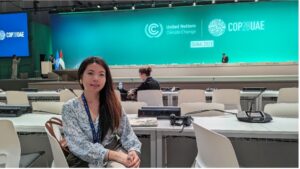January 26, 2024
Voices for Science Fellow Highlight: Chia-Chun Angela Liang
Posted by Caitlin Bergstrom
Since 2017, AGU’s Voices for Science program has helped scientists sharpen their science policy and communication skills through monthly coaching, quarterly trainings, and networking to be a strong voice for science issues that matter to them most. The Fellows of the Voices for Science program choose their own flexible advocacy and outreach goals and work towards them throughout their year in the program. Many scientists have incorporated the skills gained from the program into their research or pivoted into science communication and advocacy careers.
Chia-Chun Angela Liang is an example of one of the amazing Fellows that have completed the Voices for Science program, using her time to explore the intersection of science advocacy, policy, and diplomacy. Her time in the program has led to many exciting opportunities – including attending COP 27 & 28, becoming an AAAS science policy fellow, starting a National Science Policy Network Chapter at her university, and more. We asked Angela to reflect on her experience as a Voices for Science Fellow and share why other scientists interested in honing their outreach and communication skills should consider the program.
 Q: Tell us about yourself! Where are you in your career now and where were you when you started the Voices for Science program?
Q: Tell us about yourself! Where are you in your career now and where were you when you started the Voices for Science program?
I am a Ph.D. candidate. I am also a science policy fellow at AAAS and a science advisor at the Open Dialogues International Foundation. But, when I started in the Voices for Science program, I was just getting my toe dipped in my science policy journey. I had just started a science policy chapter at the University of California, Irvine with two other students, but I wasn’t sure where we would go with it, and I wasn’t sure which one I liked more: science advocacy, policy, or diplomacy. The Voices for Science program not only trained me in effectively speaking with policymakers, but also gave me advice and helped me figure out what I would like to do, and what I am best suited to do.
Q: What encouraged you to join the Voices for Science program?
I was hoping to find a program that could teach me science policy in a more structured way and give me mentorship and a former Fellow of the Voices for Science program recommended the program to me.
Q: What was your policy goal for your time in the program? Did it change throughout the year, and did you achieve it?
My goals in the program were to figure out what would be a good niche for me, learn to talk to policymakers effectively, and get better at writing policy pieces. I felt that I achieved all my goals. Through Liz Landau, my team liaison, I received valuable feedback, and, at the end of program, I knew that I wanted to do science diplomacy. Additionally, through the program, we got a chance to talk to our U.S. state Senators and Representatives. After that, I was able to use the skills I learned to talk to policymakers from different countries when I attended the United Nations Climate Change Conference (UNFCCC COPs) in 2022 and 2023. With guidance and information from peers, I was also able to start writing short peer-reviewed blog posts and published on the National Science Policy Network.
Q: What were your biggest “wins” and achievements in the program?
My biggest win and achievements in the programs are that I achieved all the goals I set for myself, and, additionally, I was admitted to attend the United Nations Climate Change Conference (UNFCCC COPs) as a delegate in 2022 and 2023. In 2023, I was even able to get my scientific language into the first ever, legally effective decision on a just transition topic. And since 2023, I have been working as the science advisor for Open Dialogues International Foundation. All of these have further helped me to become a science policy fellow at AAAS.
Q: Is there anything you would tell someone interested in joining or taking their first steps in science advocacy or communication?
Don’t ever feel that you are not ready! Go for it and you will find a way.
The Voices for Science program is currently accepting applications until 8 February 2024. To learn more about the program and apply, please visit our website. The Communications track is open to North and Central American-based scientists and the Policy track is open to scientists based in the US, UK, or EU. If you have any questions about the program, please email [email protected].
This blog post is part of an ongoing effort to highlight the efforts of our stellar Fellows and advocates. Stay tuned for more personal stories of scientists incorporating science policy and communication skills in their broader research and career goals.

